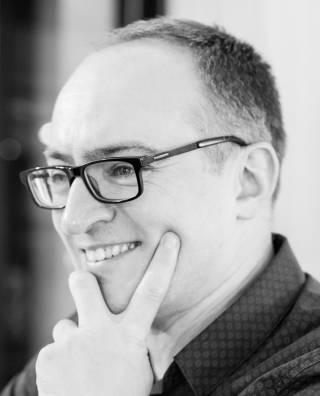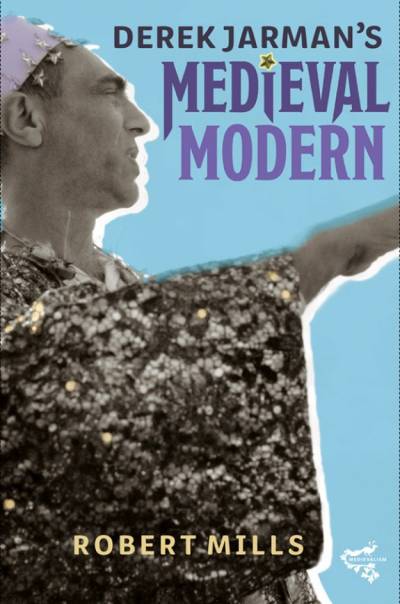Profile

Bob Mills is Professor of Medieval Studies in the History of Art Department. Between 2015 and 2018 he directed qUCL, UCL's LGBTQ research network. Bob's books include Suspended Animation: Pain, Pleasure and Punishment in Medieval Culture (2005), Seeing Sodomy in the Middle Ages (2015) and Derek Jarman's Medieval Modern (2018). Bob’s next book, Wild Forms in Medieval Art, will focus on imagery of wildness and the nonhuman in England and northwest Europe c.1200 to 1500. He is also currently planning a new project, tentatively titled Medieval Frames of War, that will explore representations of wartime atrocity in the period.
Bob has been a member of LESG, UCL’s LGBTQ+ Steering Group, since 2013 and is proud to be Out@UCL. Read more about Bob’s interests in LGBTQ+ equalities at WeAreOut@UCL.
Contact Details
Office: 406, 21 Gordon Square
Office Hours: Research leave for 2024-25 academic year
+44 (0)20 3108 4020 (internal 54020)
Email: robert.mills@ucl.ac.uk
Appointment
Professor of Medieval Studies
Dept of History of Art
Faculty of S&HS
Research Themes
Medieval visual culture; representations of pain and punishment; saints; gender and sexuality; animal studies and ecocriticism; war and wartime conduct; translation.
Research
Research Summary
Bob's research mainly focuses on the visual culture and literature of France and England between the twelfth and fifteenth centuries. He has also published on art in the Low Countries, Germany, Italy and Spain. Bob's first book Suspended Animation: Pain, Pleasure and Punishment in Medieval Culture (2005), which came out of his doctoral research, shows this range. An essay collection he co-edited, The Monstrous Middle Ages (2003), demonstrates his commitment to research with a strong interdisciplinary focus.
Bob has longstanding interests in gender and sexuality, both as historical phenomena and critical categories. He has published a number of chapters and articles in this field, contributed the medieval section to A Gay History of Britain (2007), and co-edited Troubled Vision: Gender, Sexuality, and Sight in Medieval Text and Image (2004). Feminist theory, queer studies and LGBT cultural history have always exerted a shaping influence on his research. At King's he was director of the Queer@King's research centre, and he has organized a number of symposia, conferences, research seminars and public events under this heading. He directed qUCL, UCL's LGBTQ research network, between 2015 and 2018. Bob also recently collaborated on a knowledge exchange project to support the teaching of queer and LGBT+ history in UK secondary schools.
Bob's book, Seeing Sodomy in the Middle Ages (2015), explores the relationship between sodomy and motifs of vision and visibility in medieval culture, on the one hand, and those categories we today call 'gender' and 'sexuality,' on the other. Winner of the Society for French Studies R. Gapper Book Prize, Seeing Sodomy foregrounds the role played by translation - visual, textual and cultural - in defining when and how sexual and gender diversity become intelligible. Bob is also interested in issues of translation more generally and 2012 saw the publication another co-edited collection, Rethinking Medieval Translation: Ethics, Politics, Theory.
Bob is currently completing a new monograph, Wild Forms in Medieval Art, which takes as its focus imagery of wildness and the nonhuman in England and northwest Europe c.1200 to 1500. He also has a developing interest in film and his most recent book, Derek Jarman's Medieval Modern (2018), uses Jarman's longstanding interests in medieval art and literature as a window onto topics such as anachronism, periodization and the politics of time. Bob is currently planning a new project, tentatively titled Medieval Frames of War. Focusing on expressions of wartime atrocity in medieval art, this project will investigate the capacity of artworks created during the later Middle Ages in Europe to trouble as well as mirror prevailing attitudes to war and its conduct.
Teaching and Supervision
Bob has taught a thematic seminar on 'Regarding Pain' and modules on ‘Imagining Jerusalem in the Middle Ages’ and 'Relics, Saints, Images and Power' for the History of Art BA programme. He has also co-taught the BA course 'Methodologies of Art History' and the MA core course 'Critical Debates and Methods in the History of Art', and offered MA special subjects on 'Modern Medieval: Reception, Revival, Replication' and 'Human and Nonhuman in Medieval Art'.
In the past Bob has contributed to the Gender and Sexuality Studies programme at UCL, supervising MA dissertations in this area and giving a class as part of the MA Gender, Society and Representation core course. He also set up the interdisciplinary Masters module 'Critical Introduction to Sexuality Studies', taught with colleagues attached to the qUCL research network that he helped found.
Bob is interested in supervising doctoral projects on any aspect of medieval visual culture (broadly defined); research situated at the interface between the visual and the verbal; projects on animals and the nonhuman; medievalism and medieval film; the work of Derek Jarman and other artistic responses to HIV/AIDS. He is also interested in supervising research on medieval gender and sexuality, as well as work exploring aspects of queer history and art history in any period from a theoretical perspective.
Current PhD students:
Elliot Gibbons, Art, Activism, and the AIDS Crisis in Britain (1987–1996) (joint supervisor, with Nathan Ladd, Tate Britain)
Caitlin Kane, Queer Embodiment in Accounts of Medieval Italian Women’s Relationships with Christ 1200–1510 (joint supervisor, with Catherine Keene, UCL SELCS)
Aiofe Stables, Women’s Work? Textiles, Power and Gender at the Court of Isabel of Castile, c.1474–1504 (primary supervisor)
Esme Garlake, Non-human life in early sixteenth-century Italian art (secondary supervisor, with Alison Wright).
Claire Hollis: Queer History in the 16-18 School History Curriculum: An Action Research Case Study (UCL Institute of Education, secondary supervisor with Arthur Chapman and Rebecca Jennings).
Will Ballantyne-Reid: Derek Jarman, Painter: Activism, Archives and Ephemera (primary supervisor).
Baylee Woodley: Forsaken Femininities: The Long History of Femininity from Medieval to Modern and from Monstrous to Divine (primary supervisor).
Selected past PhD students:
Louis Shankar: Loving and Dying In The Shadow of Forward Motion: A Psychoanalytic Analysis of the Art, Writing and Activism of David Wojnarowicz (joint supervisor, with Mignon Nixon).
Millie Horton-Insch: Textiles, Gender and Race in Eleventh- and Twelfth-Century Britain (joint supervisor, with Clare Lees, Institute of English Studies, University of London).
Edward Christie: Mobilising Post-War Eco Art History Against the Climate Crisis (primary supervisor, with Mark Maslin, Geography Department).
Eduardo Correia: Images and Literature in Late Medieval England (King's College London, joint supervisor with Sarah Salih).
Michael Green: H.D. and Artists After (1970 to Present) (second supervisor, with Mignon Nixon).
Rosalind Hayes: Circulated and Consumed: Tracing Animal Lives in the Visual Culture of British Meat Supply Chains, c. 1880-1910 (second supervisor, with Richard Taws).
Melek Karatas: “Illuminatrix libri jurata”: Reading Image and Gender in the Illuminated Roman de la rose Manuscripts of the Montbaston Atelier (1330–1360) (King's College London, second supervisor with Simon Gaunt).
Lauren Rozenberg: ‘Bere in thy mynde’: Phantasms, Parchment and Late Medieval Visual Culture.
Laura Spada: The Body Re-imagined: The Bizzarie di Varie Figure and Other Cycles of Prints in Seventeenth-Century Florence (second supervisor, with Rose Marie San Juan).
Euan McCartney Robson: Experiencing English Romanesque Architecture.
Magali Burnichon: Queer Representations on Television (with James Agar, Centre for Multidisciplinary and Intercultural Inquiry).
Andy Murray: The Mourners of Philip the Bold's Tomb: Structures of Feeling in the Earlier Valois Burgundian State (with Alison Wright, completed 2015).
Sophia Wilson: Living Objects: Material Culture and Non/Human Transformations in the Literature of Medieval England (King's College London, with Sarah Salih, completed 2015).
Skyler Hijazi: Figurative Bodies, Figural Children: Erotic Economies of Queer Fan Art Online (King's College London, with John Howard, completed 2014).
Wendy Gore: 'Wilful Longing to God': A Lacanian Reading of Julian of Norwich's Texts (King's College London, with Sarah Salih, completed 2013).
Victoria Blud: Louder Than Words: The Performance of the Unspeakable in Old and Middle English Literature (King's College London, with Clare Lees, completed 2009).
Tom Hodgson-Jones: Deposition and the Absolute King: The Confessio Amantis and Gower's Philosophy of Kingship (King's College London, completed 2006).
Biography
Bob Mills graduated from the University of Manchester with a BA in Medieval Studies in 1994 and an MA in the History of Art in 1996. He completed his PhD in the Department of History of Art at the University of Cambridge in 2000. The focus of Bob's doctoral research was representations of pain and punishment in medieval art and literature and there has always been an interdisciplinary bent to his profile. Reflecting these interests, Bob taught in the English Department at King's College London for eleven years, before joining the History of Art Department at University College London in 2012. He became Professor of Medieval Studies in 2017 and was Head of Department from 2019 to 2024.
 Close
Close


